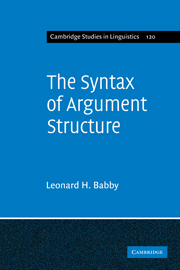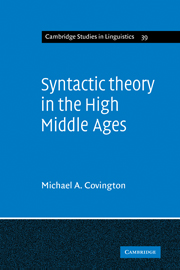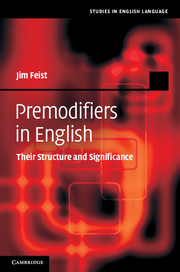The Syntax of Argument Structure
Each verb in natural language is associated with a set of arguments, which are not systematically predictable from the verb's meaning and are realized syntactically as the projected sentence's subject, direct object, etc. Babby puts forward the theory that this set of arguments (the verb's 'argument structure') has a universal hierarchical composition which directly determines the sentence's case and grammatical relations. The structure is uniform across language families and types, and this theory is supported by the fact that the core grammatical relations within simple sentences of all human languages are essentially identical. Babby determines and empirically justifies the rigid hierarchical organization of argument structure on which this theory rests. The book uses examples taken primarily from Russian, a language whose complex inflectional system, free word order, and lack of obligatory determiners make it the typological polar opposite of English.
- Authoritative - based on many years of research by a leading expert
- Comparative - uses examples of grammatical relations from Russian to support the book's theory
Reviews & endorsements
'Babby's book is well argued, clearly written, and amply illustrated with data. It will certainly play a central role in the further development of generative theory.' Slavic Review
Product details
No date availablePaperback
9780521182331
326 pages
229 × 152 × 19 mm
0.48kg
Table of Contents
- 1. The internal structure of argument structure and its morphosyntactic projection
- 2. The diathesis-driven derivation of adjectives: adjectival small clauses and predicates
- 3. The derivation of hybrid verbal adjuncts
- 4. The derivation and control of infinitive complements in Russian
- 5. Deriving the predicate instrumental: the status of predicate case.







